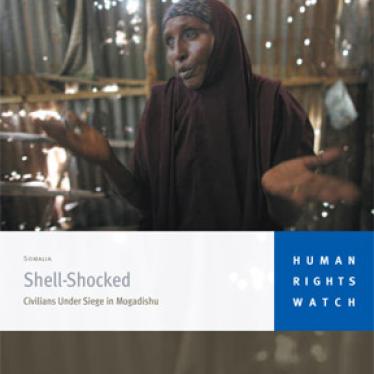(Nairobi) - Ethiopian, Somali and insurgent forces are all responsible for rampant violations of the laws of war in Mogadishu, causing massive suffering for the civilian population, Human Rights Watch said in a report released today. Human Rights Watch urged the UN Security Council during its current deliberations on Somalia to include a strong civilian protection mandate in any peacekeeping mission.
The 113-page report, "Shell-Shocked: Civilians Under Siege in Mogadishu," is the first independent, on-the-ground investigation of the fighting that wracked Mogadishu in March and April 2007, resulting in the deaths of hundreds of civilians and the displacement of 400,000 people.
"The warring parties have all shown criminal disregard for the well-being of the civilian population of Mogadishu," said Ken Roth, executive director for Human Rights Watch. "The UN Security Council's indifference to this crisis has only added to the tragedy."
Human Rights Watch documented numerous war crimes among many other violations of the laws of war by all parties to the armed conflict in Mogadishu.
Violations by the insurgency, a loose coalition of Somali armed groups, include: the indiscriminate firing of mortar rounds into civilian areas; deployment of forces in densely populated neighborhoods; targeted killings of civilian officials of the transitional Somali government; and summary executions and mutilation of the bodies of captured combatants.
Ethiopian forces backing the Somali transitional government violated the laws of war by widely and indiscriminately bombarding highly populated areas of Mogadishu with rockets, mortars and artillery. Its troops on several occasions specifically targeted hospitals and looted them of desperately needed medical equipment. Human Rights Watch also documented cases of Ethiopian forces deliberately shooting and summarily executing civilians.
Somali transitional government forces played a secondary role to the Ethiopian military, but failed to provide effective warnings to civilians in combat zones, looted property, impeded relief efforts for displaced people, and mistreated dozens of people detained in mass arrests.
"The insurgency placed civilians at grave risk by deploying among them," said Roth. "But that is no justification for Ethiopia's calculated shelling and rocketing of whole neighborhoods."
The launch of the report coincides with today's UN Security Council deliberations on Somalia. The Security Council is due to discuss the 1,500-member African Union mission in Somalia and proposals to turn the mission into a UN force.
The armed conflict in Mogadishu has steadily escalated since the Ethiopian-backed Somali Transitional Federal Government (TFG) established itself in Mogadishu in January 2007. In December 2006, Ethiopian forces with US support ousted the coalition of Islamic Courts from Mogadishu and other areas of south-central Somalia in a lightning offensive.
Since January 2007, a coalition of insurgent groups, including the Islamic Courts' militant Al-Shabaab militia, has waged almost daily attacks on Ethiopian and TFG forces, including several suicide attacks, and killed TFG civilian officials. The insurgency repeatedly launched mortar attacks from densely populated neighborhoods of Mogadishu, jeopardizing civilian security, in violation of the laws of war.
On March 29, Ethiopian forces launched the first of two major counterinsurgency offensives in the city. Ethiopian troops indiscriminately bombarded insurgent strongholds with barrages of "Katyusha" rockets, mortars and artillery, making no apparent effort to distinguish between civilians and insurgent targets.
A second Ethiopian offensive from April 18 to 26 targeted and destroyed additional areas of the city and added several hundred more civilians to the total death toll. While the precise number of civilian casualties is not yet known, estimates range from 400 to more than 1,300 deaths resulting from both rounds of fighting.
Ethiopia's intervention in Somalia is closely linked to regional security concerns, including a proxy war with Eritrea and the presence of two Ethiopian rebel movements in Somalia.
In January 2007, the United States launched several air strikes in southern Somalia, and again in June in Puntland, in the northeast. These attacks were the first US military interventions in the country since its forces departed in 1994. The US alleged that militants within the Islamic courts were sheltering individuals connected to international terrorism networks, including people wanted in connection with the US embassy bombings in Kenya and Tanzania in 1998.
"Since the major fighting ended in April, Ethiopian and Somali government forces have routinely violated the rights of civilians on the streets of Mogadishu," said Roth. "Effective counterterrorism can only be built on respect for basic rights and an end to impunity for serious crimes."
Human Rights Watch called on the UN Security Council and key international actors to use their leverage with Ethiopian and Somali government forces to end abuses and encourage respect for international law.
Concerned countries should also request and support an increased UN human rights monitoring and reporting mission in Somalia.







